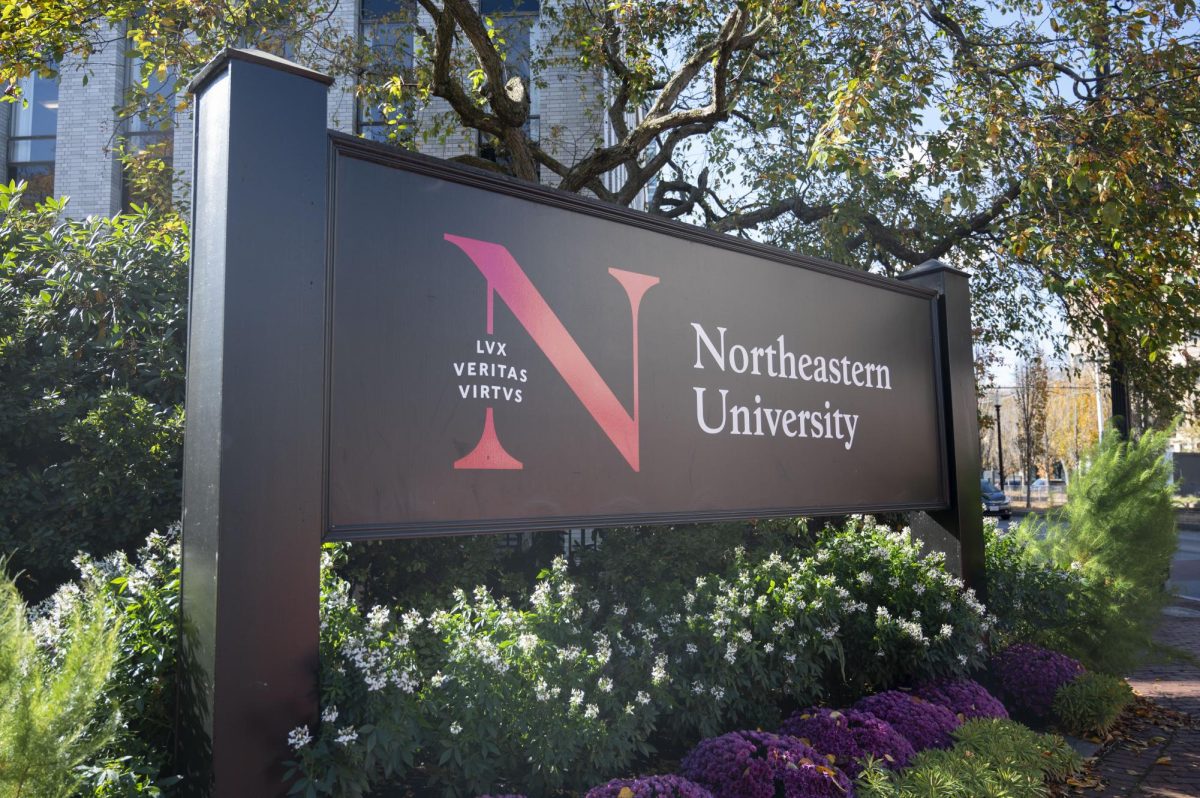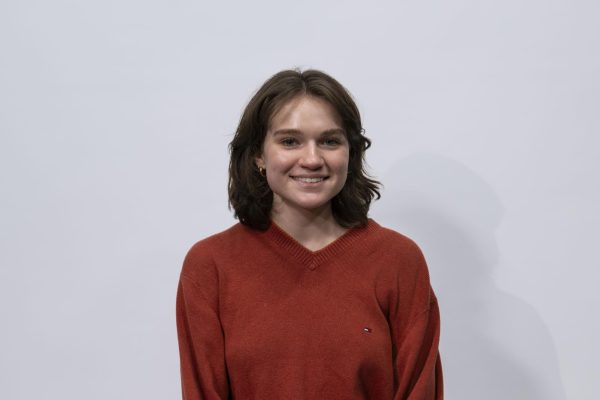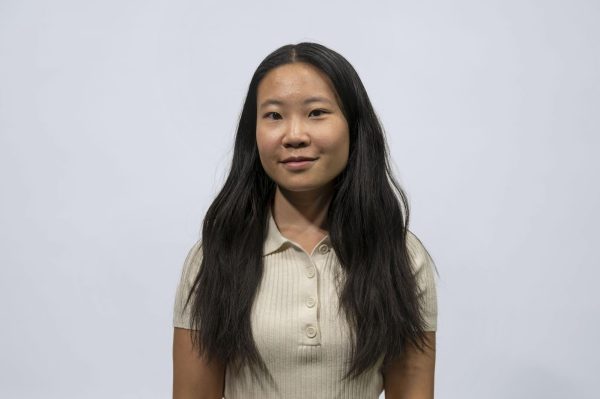Senior Northeastern officials said during an Oct. 30 faculty senate meeting that the university could allow faculty representation in the institution’s policy-making process. A senior vice president also said the external affairs department revised its FAQ page about protest regulations to remedy incorrect statements, which had elicited vocal opposition from members of the Northeastern faculty.
Despite university administration indicating openness to faculty concerns and making immediate changes to the public-facing FAQ page, faculty said they are still troubled by the signals university leaders are sending about restricted free speech.
“It would be wonderful if the administration and if the senate could urge the administration to come in line with the values of the faculty, which I think are widely shared in favor of broad university protections that are clearly stated: for faculty to speak freely, to participate in various political actions, extramural and intramural, so long as they do not violate the terms of the faculty handbook,” said associate professor of philosophy Matthew Smith.
During the meeting, Northeastern Provost and Senior Vice President for Academic Affairs David Madigan said the university could consider adding faculty to its Policy Oversight Committee — the body that crafts Northeastern policies to function in accordance with the university’s binding documents, such as the Faculty Handbook and Code of Student Conduct. Senior Vice President for External Affairs Mike Armini also said the university’s “Safe Campuses, Civil Discourse” FAQ, which has since been updated, contained statements that misrepresented university policies.
The moves follow a tense senate meeting Oct. 16, when faculty expressed significant concern about policies they said limited freedom of expression and threatened academic freedom.
After the initial meeting, the university updated its “Safe Campuses, Civil Discourse” FAQ, which is managed by the external affairs department, Oct. 25 and Oct. 28 to remove sentences saying faculty must receive permission from the provost to participate in demonstrations and advising students to report faculty for instances of bias.
Northeastern’s policies on freedom of expression are scattered throughout multiple university websites, which prompted criticism from faculty at the Oct. 30 meeting due to the apparent lack of clarity about official regulations.
“I’ve heard from a lot of faculty colleagues since the last meeting, and I heard from someone today who said ‘Last week the university website told me I needed the provost’s permission to participate in a demonstration,’” said professor of history Louise Walker. “‘This week it tells me I don’t. What is it going to be next week?’”
The external affairs department publishes FAQs when there is a “high-profile issue” affecting the university, and they are supposed to answer the most common questions the university gets about an issue. They also present a more digestible way for the Northeastern community to get information on policies officially outlined in the Code of Student Conduct, Faculty Handbook and “Policy on Demonstrations” page, Armini said.
In the past, the FAQ has delivered consequential news to the Northeastern community, including whether the institution would divest from companies manufacturing weapons for Israel and updates on disciplinary action against pro-Palestine students who participated in an unauthorized protest December 2023.
Madigan and Armini said at the Oct. 30 meeting that there was information inconsistent with official university policies in the FAQ which has been taken out.
“In this particular [FAQ], there was a sentence that had the word ‘participate’ that we took out,” Armini said. “It also had the word ‘seek’ [permission] that was replaced with the word ‘obtain.’”
Armini, a member of the university’s senior leadership team, later admitted that the sentence telling faculty they must seek permission from the provost to protest was “upsetting” and that the word “participate” “shouldn’t have been” in the FAQ.
Official university policies are crafted by the Policy Oversight Committee, which is comprised of “representatives from key areas across the university.” Madigan said the members of the committee were not listed on the policy website until after the Oct. 16 meeting, when faculty asked to make the information public.
Throughout the meeting, faculty pointed out that there was no faculty representative on the committee.
“This new policy [that we’ve all been discussing] was made [by] a committee that is not very representative — of [everyone], but definitely not the faculty,” said associate teaching professor of chemistry and biochemistry Vaso Lykourinou.
While the faculty senate oversees the Faculty Handbook and can pass resolutions, its actions are usually “toothless” unless approved by the Board of Trustees and the provost, said Dee Spencer, a member of the Senate Agenda Committee and principal lecturer of supply chain and information management.
Erica Homan, an assistant teaching professor of biology, suggested the senate appoint an interim representative to the committee while the senate figures out how to appoint a permanent representative, which Madigan agreed to.
Despite FAQ revisions, faculty express concern about university’s stance on freedom of expression
The Oct. 30 meeting was solely dedicated to discussing freedom of expression after faculty members were frustrated with the short amount of time allowed for the topic at the last meeting. Spencer said only setting aside 10 minutes for that discussion was “a huge mistake.”
“It was not prudent to raise the topic of academic freedom hastily, regardless of how it came about or how it was presented,” Spencer said in her opening presentation. “The topic itself is massive and it needs to be discussed at great length.”
In the two weeks between the meetings, the Senate Agenda Committee collected questions and comments from faculty to be addressed by Madigan and Armini, Spencer said. Madigan confirmed at the meeting that all university FAQs are authored by the external affairs department and are “absolutely not policy.”
The “Safe Campuses, Civil Discourse” FAQ was originally published in December 2023 after a wave of both authorized and unauthorized pro-Palestine student protests on campus following the outbreak of the Israel-Hamas war. The article has been updated multiple times since then, with time stamps to indicate when changes were made for transparency, Armini said.
While the articles themselves are not policy, Armini said, they are meant to simplify the university’s rules.
“The purpose of the FAQ is to explain the university’s position, but to do it in lay terms and to do it in clear language,” he said. “If you ever sit down and read the faculty handbook, [which] is the governing document, it’s not exactly what I would call user-friendly.”
Despite the FAQ previously saying professors must obtain permission from the provost to participate in protests, that language is not included in the Faculty Handbook, the Code of Student Conduct nor the “Policy on Demonstrations” page. Madigan said a previous version of the “Policy on Demonstrations” page included a link to the FAQ, which further “confused matters.”
Faculty members also said they were troubled about a sentence in the FAQ that said members of the Northeastern community can report to the Office of the Provost what they see as “bias, harassment or discrimination.”
“This last sentence in this FAQ really upset faculty, and it seemed to be a threat to faculty,” Spencer said. “It encouraged students to report on faculty, and it made faculty vulnerable to students with personal political axes to grind.”
Spencer said when she reached out to Madigan about the concerns, he told her the FAQ would be “very aggressively altered.” The sentence has since been removed from the article.
But faculty at the Oct. 30 meeting said the updates to the FAQ didn’t quell their worries or minimize the harm done by messaging the university had already sent.
Rachel Rosenbloom, a professor of law, said that while the changes to the FAQ are a step in the right direction, the “signals” the university has been giving the community have been concerning.
“We all know free speech issues on campus are under attack around the country. We’re all reading about things happening at other campuses,” Rosenbloom said. “People are on edge, and we are looking to our leadership at this university for a sign that Northeastern is not going to go down that road. [With] the FAQs, we’re sending a signal when those kinds of things suddenly show up in a FAQ.”
Rosenbloom said another “signal” sent by administration was Vice President for Communications Renata Nyul’s alleged critical comment to faculty at Northeastern’s pro-Palestine encampment in April. At the last faculty senate meeting, Smith said that in response to him and professor of sustainability science and policy Jennie Stephens approaching Nyul to try to de-escalate the situation, she asked them, “Do you know who pays your salary?”
Rosenbloom said it was concerning the university hadn’t directly denied the interaction happened.
“It feels a bit like our current political culture of just an attitude of ‘never apologize for anything, never acknowledge anything,’ and that’s part of what I think is driving some of our [concerns],” she said.
In response, Armini said the “account of what happened is not true,” that the “encounter was mischaracterized” and that Nyul is being bullied and harassed.
“You’re not going to get a further answer on this topic,” he said.
Later, Rosenbloom said Armini’s response was illustrative of the kinds of signals from top university officials the faculty is picking up on.
“What we’re looking for is some reassurance, and instead what we’re getting is a sense that the university will attack its own faculty, call us bullies,” she said.
Smith said the university has not been as protective as it should be of academic freedom for faculty.
“The tenor of recent communications and actions from the administration suggests a less than fulsome commitment by the university to such protection,” he said. “There might be tension between the university’s potentially hostile stance of free speech and the broader faculty’s commitment to free speech.”
University policies are scattered throughout university documents, administrators say
Distinguished Professor of Law Richard Daynard questioned the university’s standards for approving on-campus demonstrations and how that can come across to university stakeholders. In response, Madigan said the standards are present but “buried a bit in the student handbook.”
“We need to do some work to surface them and make them clearer,” Madigan said. “But the standard [for approval]…has nothing to do with the content. It purely has to do with [whether it’s] safe and will it disrupt university business.”
Lisa Sinclair, vice president of legal affairs and deputy general counsel at Northeastern, said the demonstrations policy has been in effect for more than 20 years but was only listed in the undergraduate student handbook until recently, when it was moved to the “Policy on Demonstrations” page at the “request of the community.”
Madigan also explained — in response to a question about why the university seemingly implemented the policy for faculty to get permission from the provost to organize protests during a period of heightened conflict — that the rule is not new and has existed for “at least a year.”
He said that policy was also buried in the student handbook, even though its wording refers to all faculty, staff and students.
Student demonstration policies are mostly found in the Code of Student Conduct and the Student Organization Resource Guide. The former is administrated by Northeastern’s Senior Vice Chancellor for Student Life Madeleine Estabrook and the latter is crafted by the Center for Student Involvement. Faculty policies are laid out in the Faculty Handbook, which the faculty senate can revise with the approval of the provost and Northeastern Board of Trustees.
Toward the end of the meeting, Walker proposed a resolution that called for the senate to strengthen language around freedom of speech in the faculty handbook to align with the 2024 standard presented by the American Association of University Professors, or AAUP. The university currently adheres to the AAUP’s regulations outlined in 1940. The resolution did not itself present any changes.
After some senate members expressed concern that the resolution was not presented to faculty in advance, senators passed a motion to postpone the vote on the resolution. It will now be discussed at the senate’s Nov. 6 meeting and possibly voted on Nov. 20, Heidi Kevoe-Feldman, chair of the faculty senate’s agenda committee and an associate professor of communication studies, told The News in an interview.
The Huntington News is dedicated to serving the Northeastern University community with original, professional reporting and creating an environment in which student journalists can learn from one another. Support an independent, free press at Northeastern University with your donation today.












